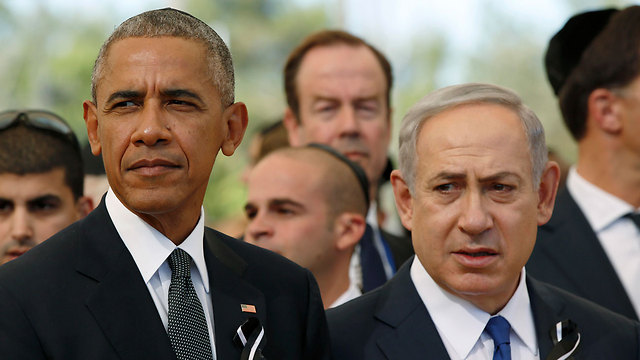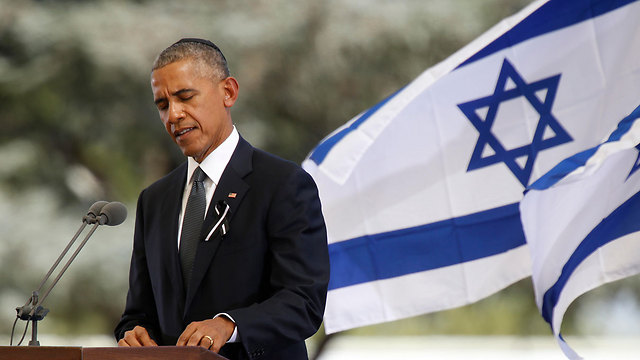Analysis: While paying tribute to Shimon Peres, Obama employed his oratorical prowess to communicate to the PM his true feelings toward him by expressing his perception of the startling contrast between the former president, inspired by hope, and the prime minister, gripped by fear.
When Barack Obama delivered his eulogy to Shimon Peres Friday on Mt. Herzl in Jerusalem, many of his listeners will have been moved to tears.
The American orator, who rarely fails to strike the most sensitive emotions during some of the most significant moments in our history, once again delivered a speech so powerfully praising the former Israeli president that even those unfamiliar with his feats would also have conceivably “fallen prey to his charms” as Obama marshalled his most eloquent prose to bid farewell to this Israeli giant.
The vast majority of the speech was indeed a glistening catalogue of Peres’s political and personal attributes. However, the president could not refrain from taking the opportunity to slight Prime Minister Netanyahu no fewer than five times.

“Even in the face of terrorist attacks, even after repeated disappointments at the negotiation table, (Peres) insisted that, as human beings, Palestinians must be seen as equal in dignity to Jews and must therefore must be equal in self-determination,” Obama said.
This statement, which appears to be a fairly innocuous commendation of Peres, is actually the first in a series of attempts to juxtapose the outlooks of Peres—“the man of hope” and Netanyahu—“the man of fear”; Peres, the man who viewed Palestinians as human beings, equal and deserving of self-determination, and Netanyahu, the man who seeks to deprive them of this right and views them as unequal sub-humans.
During a 2011 speech in which Netanyahu looked Obama squarely in the eye in the Oval Office and publicly told him that a return to the 1967 borders was “not going to happen,” some critics accused him of treating the president to a seemingly interminable lecture on Jewish history. Unthinkable. What gall, some said.
Several years later, President Obama stands in Israel explaining to the nation that “because of Peres’s sense of justice, his analysis of Israel’s security, his understanding of Israel’s meaning, he believed that the Zionist idea would best be protected when Palestinians too had a state of their own.”
Obama understands Zionism. Netanyahu lacks even the slightest clue, so one would gather. With the prime minister navigating the ship of Zionism on its journey, seldom granted a prolonged rest from the inclement storms of the Middle East, Zionism is not protected. So goes Obama’s implication.

On the contrary, Netanyahu is sailing toward a wave which will inevitably engulf and capsize a dream which only a leader such as Shimon Peres could have averted, thereby ensuring its permanency. Here, Obama’s message is simple: Bibi, you don’t understand Zionism. You are leading it down the path of failure.
The American president then compared Peres to leaders and international figureheads such as Nelson Mandela and Queen Elizabeth. These people, he said, “find no need to posture or traffic in what’s popular in the moment,” unlike Bibi; “people who speak with depth and knowledge, not in soundbites.” unlike Bibi. “They find no interest in polls or fads,” unlike Bibi. “And like these leaders, Shimon could be true to his convictions even if they cut against the grain of current opinion,” unlike Bibi.
“He knew better than the cynic that if you look out over the arch of history human beings should be filled not with fear but with hope.” In Obama’s analysis, Netanyahu could not be less representative of the ideals espoused by Shimon Peres. Indeed, Peres was a man free of fear, while Netanyahu, Obama was intimating, is merely a cynic beset by fear.
Peres, Obama continued, reminded people that like the USA, Israel was not built by cynics. Netanyahu’s ilk, on the other hand—the cynics—had no part in the building of the Jewish state, but rather are charting the course for its deconstruction. “We exist because people before us refused to be constrained by the past or the difficulties of the present. And Shimon Peres was never cynical.” Let Netanyahu not forget that, is the message.
Finally, Obama delivered another backhanded insult at Netanyahu: “He understood that it is better to live to the very end of his time on earth with a longing not for the past, but for the dreams that have not yet come true: an Israel that is secure in a just and lasting peace with its neighbors.” The current Israeli premier harbors ambition only for the first part of the statement.

One can agree that Netanyahu is a cynic enslaved by fear and an obsession with the past, or one can believe otherwise. Whatever the truth may be about the prime minister, the outgoing president of the United States made his opinions abundantly clear during the funeral of one of the founding fathers of a country which Netanyahu, without any doubt, seeks to safeguard against the perils of the “particular madness of anti-Semitism which has run like a stain through history,” as Obama said during his eulogy.
While Obama is indeed a dreamer of what the world could be, Netanyahu cannot be blamed for falling victim to the same fear from which Peres himself suffered, a fear which Obama acknowledged during his speech: A fear of the “sea of thick and threatening forces” on which Netanyahu, even in 2016, is sailing.
As reported by Ynetnews
